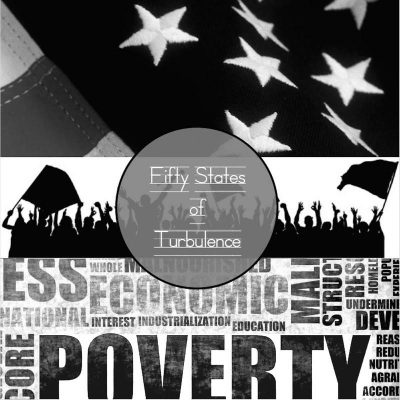
Fifty States of Turbulence
On all sides, the American presidential election season of 2016 has been a mix of circus act, reality TV and nightmare. The media have completed their devolution from yesteryear's disseminators of fact to today's purveyors of entertainment, throwing their public responsibility to the wind in favor of good ratings and the pleasing of their shareholders. The public, in turn, tends to only pay attention to stories which support their own biases, even when those stories are in complete odds with established fact. Instead of becoming more educated and well-rounded by the preponderance of media outlets, we've stuck our heads in the sand, only coming up for air when we sense a like-minded perspective headed our way. Economic and racial strife are front-and-center in the current political climate, and it's hard to see them being replaced by anything else soon. Huge swaths of disenfranchised voters exist, not invited to the prosperity party due to their dependence on failing industries, not having the education or money to help pull them out of their situation, or facing racial bias, subtle or acute at the hands of neighbors, coworkers, the police or politicians. Donald Trump has thrown a match on the ruins of these people's dreams, and predictably an inferno borne of frustration has been the result. His abhorrent and crude behavior marks him as an obvious bully and narcissist, with a long history of racist and misogynist conduct. People in his own party regard him as the least-qualified presidential candidate in American history. Hillary Clinton, who courts Wall Street and Big Pharma, gets paid hundreds of thousands of dollars to share her thoughts with them and then refuses to divulge the contents of those speeches to the public whose vote she craves. Constantly shifting her stance on important topics to whatever is most politically advantageous, it's impossible to believe anything that she says. Then there is the morally bankrupt Democratic party, which actively worked against one of it's own candidates, Bernie Sanders, in order to ensure the success of their favored one (Clinton). In short, corruption exists on all sides. All of this can make it hard to find a way forward which leads to positive change and a continuing of the so-called 'American Dream'. Artists try to make sense of the world around them through their art. For me, the song which began my path towards the release of this collection, 'The Americans', is my take on the American experiment. Shown as a lumbering beast in the guise of the machines of American industry, taking one step forward and at times two steps back, America is depicted as the giant that we are all tied to. We're cautiously optimistic for it's future, yet also gravely concerned about it's present. There are cautionary notes, where I was thinking about racial injustice and inequality, the treatment of Native Americans, police brutality and the hoarding of wealth by the so-called upper class. These low points are mixed with occasional periods of transcendent success and progress, for example LBJ's 'Great Society', voting rights for women, the Civil Rights Movement, the Space Program of the 1960's. This negative-followed-by-positive pattern repeats through the song in a way that's all too real for me. The song ends in it's most upbeat section, a syncopated part meant to show renewed progress and hope, with a few notes of caution thrown in for good measure. Other tracks on this release are about similar subject matter: 'Manifest Destiny' (the genocide of the Native American people in the name of advancement of white, European culture), 'Falling Prophets' (the loss of integrity and morality in the media), 'Ignorance Sometimes Wins' (citizens being ruled by bias and ignorance) and 'Change Will Come' (acknowledging this constant, and being hopeful of a positive trajectory). America is definitely a work in progress. We do take significant steps backwards at times, and at others find it difficult to move forward. But the overall path is one of positivity which transcends failure and negativity. That's what I hope to show through this release. Thanks for reading. Steven Ray
